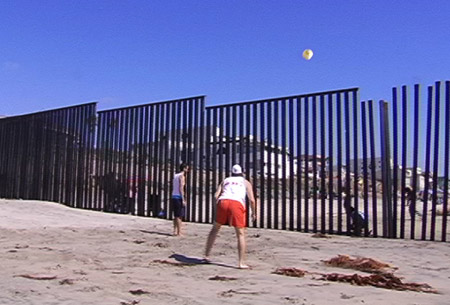
Though my reflex was to read David Antin’s Artforum review of Lawrence Weiner’s Whitney retrospective as a bit of an overshare:
…these readings are as slippery as rain and evaporate fairly quickly. Take [a 1962 work] “an object tossed from one country to another.” In 1962 it could have read as an ironic invitation to think of the Cuban Missile Crisis. Now it could suggest a case of extreme rendition—a Canadian citizen kidnapped by the CIA and flown to Syria for torturing. But “tossed” is a casual term, unlike “hurled,” and less energetic or violent even than “thrown.” So perhaps the most meaningful reading would invoke this casualness more directly, even while taking into account the relation between countries, for which the passage of anything from one to another almost immediately suggests borders and contraband and anything-but-casual concerns with immigration.
you gotta love any story that involves Weiner and Joseph Kosuth and Conceptual champion Seth Seigelaub dropping by a California border town for lunch and Marlboro-tossing.
And yet I can’t resist making my own thoroughly subjective associations–like Border Volleyball.
Last summer, Brent Hoff, the editor of Wholphin, McSweeney’s DVD magazine, packed up some friends and a ball and headed for a pick-up game of volleyball at the mouth of the Tijuana River, which empties into the Pacific at the US-Mexico border.
For an hour or so, Hoff and Joshuah Bearman played volleyball across the 30-foot border fence with Jerry and Larry. Bearman wrote about the trip for LA Weekly last summer, but I found the documentary short on Wholphin #3.
I’ve been late to the Wholphin game, partly on purpose; though it involved work by some of my own filmmaker mancrushes [David Russell, Alexander Payne], I felt the need to resist McSweeney’s fanboy syndrome. I should’ve given in earlier. After watching through all the Wholphin issues to date the last few months, I’m quietly blown away, even though there’s nothing that feels particularly essential [one exception, just a minute].
Short films are like that; they’re a take it or leave it medium that’s so inconsequential, even a maker of short films has to wonder what the point is sometimes [ahem]. And yet, Wholphin makes shorts feel organic, logical, and enjoyable. Some of the best moments are actually in between the films: the navigation menus and transitions are all microshorts and unusual footage, programmed in a way that makes you want to explore, as opposed to all the overproduced studio DVD navigation which inevitably feels like it’s keeping you from what you want to do, which is just watch the damn movie.
Anyway, after buying all the back issues, I’m caught up, and now I’m a Wholphin subscriber, and I’d be happy to suggest you should be, too.
But about that essential DVD content: Wholphin Nos. 2-4 each include, on a separate DVD, the three parts of Adam Curtis’s mindblowing documentary, made for the BBC in 2004, The Power of Nightmares. Curtis traces the parallel, intertwined rise of militantly conservative Islam and emergence of Al Qaeda and the American Neo-conservative movement which, he argues, dishonestly supports and exploits the existence of an Islamist Threat to further its own political and ideological ends. It’s a cogent and disturbing read of history–and the present–that Americans should be aware of, not only because it’s so full of dots that remain unconnected in our country’s mainstream analysis, but because those dots aren’t even in the picture our over-consolidated media provides.
Lawrence Weiner at the Whitney through Feb. 10 [artforum]
Check out Wholphin overall or just a clip of Walleyball [wholphindvd.com]
Joshuah Bearman’s LA Weekly account of the game and the making of the short [laweekly]
